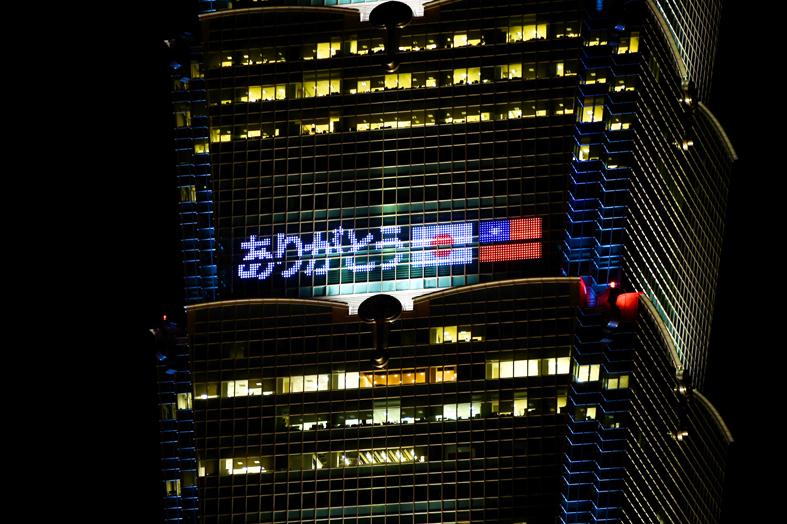Although the close relations between Taiwan and Japan will likely continue despite the death of former Japanese prime minister Shinzo Abe, the ties have lost a key figure, academics have said.
The sudden passing of Abe, who was assassinated during an election campaign event in Nara, Japan, on Friday, has sparked discussions on whether it would change Taiwan-Japan relations.
Abe’s spirit of “protecting Japan” is reflected in the Liberal Democratic Party’s (LDP) platform, which seeks to raise the country’s defense budget to 2 percent of GDP, similar to a goal set by NATO, Voice of America yesterday quoted Tamkang University Graduate Institute of Japanese Political and Economic Studies director Tsai Hsi-hsun (蔡錫勳) as saying.

Photo: Tu Chien-jung, Taipei Times
Japanese Prime Minister Fumio Kishida is unlikely to change the platform, Tsai said, adding that Abe’s notable statement that “a Taiwan emergency is a Japan emergency” remains valid, as Japan and Taiwan have similar interests.
Abe’s death is similar to the death of former president Lee Teng-hui (李登輝) last year, Tsai said, calling the two former leaders key figures in their countries’ relationship.
Before the two leaders became friends, such public, high-profile interactions between Taipei and Tokyo were unthinkable, the radio broadcaster quoted Tokyo International University Department of International Relations professor Masumi Kawasaki as saying.
The two had a teacher-student, or even father-son relationship, which motivated Abe to promote Taiwan-Japan ties, said Kawasaki, the author of Lee’s Dialogues.
But unfortunately, he has no successor, as LDP’s Policy Affairs Research Council chairperson Sanae Takaichi, an outspoken friend of Taiwan, has too little power in the party at the moment to significantly boost the ties, Kawasaki said.
China might seek to profit from Abe’s death and use the 50th anniversary of diplomatic ties between Beijing and Tokyo to push Japan in a more China-friendly direction, he said.
There is currently no member of the LDP faction formerly dominated by Abe who can confront China, while the faction led by Kishida might replace Cabinet members closely associated with the former prime minister, such as Minister of Defense Nobuo Kishi, at the next opportunity, he said.
If Kishi and Takaichi were to be replaced, the Japanese government might become more China-friendly, Kawasaki said.
When Abe was prime minister, he placed a strong focus on national security and pushed for amending Article 9 of the Japanese constitution, which would remove curbs on the country’s defense capabilities, he said.
Whether constitutional reform remains on the agenda depends on whether Kishida remains prime minister after yesterday’s Japanese House of Councilors election, Kawasaki said.

Chinese spouse and influencer Guan Guan’s (關關) residency permit has been revoked for repeatedly posting pro-China videos that threaten national security, the National Immigration Agency confirmed today. Guan Guan has said many controversial statements in her videos posted to Douyin (抖音), including “the red flag will soon be painted all over Taiwan” and “Taiwan is an inseparable part of China,” and expressing hope for expedited reunification. The agency last year received multiple reports alleging that Guan Guan had advocated for armed reunification. After verifying the reports, the agency last month issued a notice requiring her to appear and explain her actions. Guan

A preclearance service to facilitate entry for people traveling to select airports in Japan would be available from Thursday next week to Feb. 25 at Taiwan Taoyuan International Airport, Taoyuan International Airport Corp (TIAC) said on Tuesday. The service was first made available to Taiwanese travelers throughout the winter vacation of 2024 and during the Lunar New Year holiday. In addition to flights to the Japanese cities of Hakodate, Asahikawa, Akita, Sendai, Niigata, Okayama, Takamatsu, Kumamoto and Kagoshima, the service would be available to travelers to Kobe and Oita. The service can be accessed by passengers of 15 flight routes operated by

GIVE AND TAKE: Blood demand continues to rise each year, while fewer young donors are available due to the nation’s falling birthrate, a doctor said Blood donors can redeem points earned from donations to obtain limited edition Formosan black bear travel mugs, the Kaohsiung Blood Center said yesterday, as it announced a goal of stocking 20,000 units of blood prior to the Lunar New Year. The last month of the lunar year is National Blood Donation Month, when local centers seek to stockpile blood for use during the Lunar New Year holiday. The blood demand in southern Taiwan — including Tainan and Kaohsiung, as well as Chiayi, Pingtung, Penghu and Taitung counties — is about 2,000 units per day, the center said. The donation campaign aims to boost

The Central Weather Administration (CWA) said a magnitude 4.9 earthquake that struck off the coast of eastern Taiwan yesterday was an independent event and part of a stress-adjustment process. The earthquake occurred at 4:47pm, with its epicenter at sea about 45.4km south of Yilan County Hall at a depth of 5.9km, the CWA said. The quake's intensity, which gauges the actual effects of a temblor, was highest in several townships in Yilan and neighboring Hualien County, where it measured 4 on Taiwan's seven-tier intensity scale, the CWA said. Lin Po-yu (林柏佑), a division chief at the CWA's Seismological Center, told a news conference